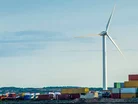Has COVID Opened the Door for Sustainable Supply Chains?

As the pandemic begins to subside and a new sense of reality becomes normal, the food industry must take the opportunity given by COVID-19 to do a stock take. It is critical that the supply chain is being investigated, evaluated and re-invented with sustainability as its core, driving the change consumers are demanding and delivering real impact for our environment. The development of sustainable global food systems has historically been held back by the perception of rigid, immoveable operations and lack of profitability, for example, manufacturers refusing to reduce food air miles, due to potential costs of new packaging machinery required onsite.
The key during the pandemic, to maintain food on our supermarket shelves in a safe and timely manner, was to reinvent our supply chain and make it more agile. COVID-19 forced consumer interactions into tightly defined and narrow points of contact, such as supermarkets. Spikes in demand quickly led to empty shelves in the short term, with producers unable to react fast enough e.g. UK flour shortages were not caused solely by panic buying but also by scarcities in final packaging materials.
The COVID-19 pandemic has forced the hand of all players in the supply chain to adapt their operations. The hospitality industry closure and consumer panic buying forced manufacturers and suppliers to adopt time-honoured methods to ensure food got to our supermarkets on time. The pressure to do this safely was huge, with a heightened emphasis on hygiene under the mantra “if it’s not SAFE it’s not FOOD”. As well as a huge surge in demand in supermarkets, consumers also circumvented some of the supply chains entirely by accessing local producers directly, because they were felt to be less risky. These shifts in their usual operating model compelled retailers to adapt, fundamentally disproving the idea that old supply chains were too entrenched to change.
Improving sustainability through the food system is a big task and it can be frightening to look at the whole value chain in one go. However, now the pandemic is subsiding it provides a unique inflexion point. As businesses assess the impact of the past 16 months, they have decisions to make between continuing with their newer, more agile formats borne out of the pandemic, or as lockdowns abate, moving back to more traditional supply chain routes. Businesses should take a step-by-step look at the changes that were made and how they can be built on or adapted, assessing decisions that were made rapidly and correcting any that impacted negatively on sustainability - for example, the huge uplift in-home deliveries of single items. Companies that develop sustainable supply chains now will, in the long term, have a stronger survival chance, before government regulations and consumer choices drive costly compliance or bankruptcy. Those that can quickly and effectively incorporate sustainability into their business models will continue to thrive and hold a key competitive advantage over those who ignore it.
As supply chains continue to evolve further, unsustainable methods can continually be adapted moving forward using different methodologies. With the growing demand from consumers, it will help businesses to create a food system that puts its environmental impact at the forefront of operations. Businesses must take this opportunity to assess step-by-step the changes made over the past year and identify key areas for further adaptation, focussing on sustainability as the next major driver of change, before consumers start shopping with competitors that do have a sustainability plan in action.
We are already seeing restructuring after the pandemic, for example with the American manufacturer of consumer foods, General Mills, but moving forward into a post-COVID-19 world, the growing importance of sustainability will impart similar pressures to the pandemic on businesses. Shorter supply chains have now been developed to allow for the shorter shelf life of products. This in turn allows for a removal of plastic and multilaminate packaging designed to give products long shelf life and be held in warehouses for months on end. Development of this direct to market supply chain will allow for new recyclable packaging, which inherently has reduced barrier properties than what is available today.
Given the ever-increasing consumer focus on the sustainability of products, the food system, as it did with the pandemic, is facing another major driver for change. The only difference is that now, the food system has shown that it can change to meet dramatic fluctuations in consumer demand, whilst maintaining safety and making this change quickly if required. It is clear that the pandemic has had clear winners and losers in the food industry - those who adapted fastest and most effectively thrived, leaving those that didn’t behind.
- Manufacturers struggle to keep supply chains resilient - BCGProcurement & Supply Chain
- 4 year supply chain delay for Toyota, as workers catch CovidProcurement & Supply Chain
- Textile manufacturing is moving in a sustainable directionProcurement & Supply Chain
- The answer to high tech supply chain challengesTechnology

